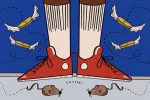It’s highly likely that non-white individuals have experienced acts of individualized racism, such as in the workplace or in the private sphere, but the pervasive and insidious reality of institutionalized racial harassment in schooling often goes unchecked, unidentified or ignored because people are blind to the signs.
When individuals are constantly subjected to the violation of their privacy or rights, the presumption of guilt rather than innocence, and the reoccurrence of microaggressions, they are being marginalized and stigmatized as a result of their race. When said individuals are confronted with episodes of racial harassment or everyday experiences of discrimination, they are likely to develop racial trauma, which has been shown to result in poor psychological health, well-being and overall functioning, according to the Journal of Counseling Psychology.
Additionally, a 2009 report published by the American Psychological Association found that racial trauma has been associated with lower “self esteem, self-worth, and adaptation” among marginalized youth. Racial harassment and race-based traumatic stress have also been found to be correlated with negative physical health outcomes, and the likelihood of experiencing racial stress and negative health outcomes has been disproportionally higher for Black Americans than any other group, according to a 2019 article published by American Psychologist.
For this reason, a 2018 study published in Practice Innovations reported that, as a result of the negative impact of their racial socialization in comparison to white people, ethnic and racial minority groups experience higher rates of post-traumatic stress disorder (PTSD).
School is one of the easiest places for people to target minorities, as interactions between teachers, students and school administration are so commonplace that punitive, race-based prejudicial treatment can be mistaken for ordinary punishment, and perpetrators of racial harassment are not caught. Learning how to recognize signs of racial harassment can help individuals cope with racial trauma and expose their tormentors; here’s how to identify them.
You can identify as a victim of racial harassment if you have experienced one or more of the following:
Suspicious Behavior
Your teacher acts suspiciously kind to white students but singles out Black or other minority students. Your teacher constantly reproaches minority students for certain behaviors while rewarding white students for the same behavior, and only enforces the rules when it applies to a certain group of students. For example, your elementary school teacher makes you flip your card from green to yellow when you talk out of turn and ask a question, but rewards a white student with a piece of candy for speaking without raising their hand, claiming their curiosity is excellent.
During parent-teacher conferences, your teacher makes a note to emphasize how “difficult” you are and how you “refuse to follow directions” and are “always asking stupid questions.” She calls you the class clown. The funny guy who goofs off because you are in desperate need of attention — she implies you aren’t getting enough attention at home, and says patronizingly, “It must be difficult being one of many children, left to your own devices.” You don’t know where she got that idea from. You are an only child, and your parents work from home. You receive plenty of attention.
She says you “disturb classroom discussion” and encourage other kids to misbehave because you can’t sit still at your seat without fiddling with your hands or kicking your feet under the desk, which she says is done purposefully, out of spite. She reprimands you for disobeying her authority. You mention how the white peer that sits next to you has restless leg syndrome as well, but she shushes you and tells you not to compare yourself to other students, especially the model ones, unless you are attempting to follow their example. You can’t put your finger on it, but you possess the sneaking suspicion she doesn’t like you. Too bad you can’t prove it.
Deviant Labeling
Your teacher has labeled you a deviant student, and constantly suspects you of bad behavior. You are repeatedly accused of fudging reports, cheating on tests or using underhanded schemes to get ahead with no proof.
A student disrupts the class by yelling out F-bombs and other swear words and the teacher automatically assumes you are at fault without asking around and threatens to give you detention.
Your teacher confronts you when someone leaves an anonymous note on her desk calling her ugly and an awful teacher and it doesn’t even match your handwriting, but she says you have 24 hours to issue an apology or she will take you to the principal’s office and writes an angry email to your parents. She says if it happens again, she will give you a suspension, unwarranted, no questions asked, unless you find proof you are innocent.
You bristle at the unfairness of it all and try to convince her you are a good student by sitting quietly and observing all of her lessons while taking meticulous notes, but it’s no use; she has decided you are a “bad” student, and when she sees you watching her for the purpose of listening and paying attention, she accuses you of being up to no good, and makes it a point to make an example out of you, giving you a mini-quiz on the spot, asking questions you don’t know the answer to. And then, when you fail to answer a question she posed that didn’t even relate to the subject material, she tells you to “drop the act” and quit “pretending” to be studious, because she doesn’t buy the “quiet act.” You don’t tell her you’re not acting, but she’s convinced you’re a character in a script anyway, and she’s got you all figured out. It just so happens that she’s the one who wrote the play.
Exacerbated Call-outs and Dismissals That Result in Demoralization
Your teacher begins calling you out for minor behaviors and mistakes, incrementally increasing the frequency of her callouts and the severity of her punishments. You are castigated for every slight mishap or nuisance, such as leaving a sticky-note note on your desk or failing to sharpen your pencil before class or use the restroom during passing period instead of asking for permission to go during class. She finds any elementary reason to critique you.
You forget to turn in your homework assignment once and she rebukes you in front of the whole class for being “lazy” and “forgetful” while comparing you to a white student who has never missed any assignments and praising him for his “hard work” and “efficacy.”
When you win a school talent show for a rap you made, your teacher dismisses your talents and accomplishments and says it was the result of “luck” or implies you only won because of your race. She says something dismissive like “Of course you won, all black boys can rap,” or says something ignorant like “Well, they wouldn’t have made a white boy the winner because they would have argued it’s cultural appropriation of Black culture, so that’s why you won.”
Your teacher consistently implies that your successes aren’t valid and you got them because someone felt sorry for you or because someone else deserved it but was slighted since they are white. She acts as if you’re disposable and you begin to think she’s right. You question your worth and whether you’re ever going to be somebody important. She tries to convince you you’re nothing special — you’re a nobody. She makes it a habit to break you down.
Stereotyping
The dean of students also participates in racial harassment. He implies you only got into Harvard because of affirmative action. He claims his son would have gotten in, too, if he fit the diversity quota, implying you’re just a Black token with no individual merit or academic acumen whatsoever. He insults your intelligence and your worth, and asks why you didn’t apply to Howard instead, imploring: “Isn’t that where all the Black kids go?” He doesn’t hide his contempt for you or your people. He thinks institutions like Harvard are above you and someone more deserving than you was cheated out of their rightful place because of the color of your skin. He thinks your melanin is an advantage. He has no idea it makes you target practice for people like him.
Your coach smells marijuana near the boys’ locker room and assumes you were the one smoking a bong in the bathroom. He tells you that if he catches you again, you’re off the team, and says he knew he was wrong to “trust people like you.” He says you’re just another “rule-breaker,” just another kid from “the wrong side of town.” He says, “you can leave the hood but it never leaves you.” He thinks you’re straight out of Compton. He thinks you’re street. You’re a thug, you’re ghetto. You’ve got nothing good going for you in your life; you’re never going to make it. You’re a waste of the school’s good faith — a wasted opportunity. You’re never going to live up to your potential. You’re no good at all. You’ll never amount to anything more than trailer trash.
He reveals that other teachers warned him about your kind, and cautions that you better pray he doesn’t find out about any more instances of criminal behavior and locker-room misconduct because you’ll be banned from school, too, not just from sports — he’ll ensure it. And his word is as good as it gets. He says this isn’t a [thinly veiled] threat, it’s a promise.
He laughs when he says that “You can kiss your scholarship goodbye,” assuming you even had one in the first place. He thinks you’re poor, because you’re Black, and all Blacks are poor, obviously, and he thinks a scholarship is how you can afford the cost of private school tuition.
You don’t tell him what you already know: You live within his subdivision, one of the most affluent in the country. You take his threats very seriously; you know what happened to the last kid who was named a “bad influence” by the coach — he was expelled and the school district revoked all of his state championship wins. It cost him a full-ride scholarship to Brown University. You won’t make that same mistake and incur the wrath of a powerful white man.
You don’t want the same fate. You’re a good kid.
You won’t let him make an example of you.
Sometimes you wish your tears were bullets so you might actually prove to be what everyone suspects — dangerous.
But then that would mean you are guilty, and you have only ever been innocent, tried for the crime of living while Black. You will not pay the price with your existence. Your life matters even when they try to convince you it doesn’t. You refuse to give up the will to live.
Here are some symptoms of experiencing racial harassment and trauma:
Anxiety
You are fearful of overstepping imaginary boundaries. You are constantly being watched and policed by your teachers and administration, and you can’t bear to make the wrong move. You feel trapped, cornered. You are filled with race-based stress and tension, racial harassment in your body.
Depression
You are suffering from chronic, unstable and despondent moods. You feel sad, angry and irritable most of the time. You struggle through the day — you can barely function. You feel helpless, like you are not in control of your own life. You feel withdrawn. You are constantly disrespected. You remember the last time your teacher accosted you in front of the whole class, lashing out at you for your posture, accusing you of “scaring other students,” attempting to intimidate or impress the teacher, “looking angry,” “having a smirk on your face,” being insolent and smug, defiant and hateful because you crossed your arms over your chest, and having a “bad attitude problem.”
You’re a problem now, a pest other people want to get rid of, and there’s little you can do to change their minds. They’re trying to extinguish you, as if you aren’t already part of a dying species. You feel like your people are going extinct, but if you get angry, they’ll eradicate you, too. You’re nothing to them, nothing they can’t control and puppeteer or mistreat at will. Powerless and subdued, miffed and indignant but resigned to your fate, what can you do? What power do you have? You are powerless to change the color of your skin — your pigment rules.
You know what it’s like to be exposed, to be ridiculed, to experience hostility and be criticized for everything you do, judged for every action you take, condemned for every small mistake.
You know what it’s like to be overlooked and perceived as unworthy, incompetent, lacking. You have an insatiable hunger to prove yourself. You have nearly died trying. People have been unkind to you; they have labeled you a threat.
You feel like your body is a witness to invisible violence and you are wrapped in a set of invisible, heavy, interlocking chains. You are constantly confronted with stigma, forcing you to draw in silent screams and take deep breaths. Drawing in oxygen hurts like a necklace wrapped too tightly around your neck, an arm strangling you. Air is a chokehold. You are suffocating within self-estrangement and the attempt to cloak the feeling of endangerment, break the spell of embodiment. If you could bleed, your blood would spell out the word asphyxiation.
It hurts to breathe, it hurts to live. Your eyes water, drip wetness down your cheeks. You feel like your body is a lesson in cultural humility, and you have been taught the pedagogy of the weak.
You can’t help but re-live negative events and experience distress about thoughts of suicide. You are always on alert, but at the same time, you are sick of others’ hypervigilance. You are sick of their eyes watching you. Monitoring you from a distance, tracking your body movements, following you across every imaginary alley, following you down every staircase and every hall, following you into every classroom.
When you walk down the hallway, you are incentivized to run, and have to quell the instinct to prove everyone else right and yourself wrong. You convince yourself to stay where you are — don’t run.
You are a good kid. You didn’t do anything wrong. You have no reason to hide or to worry or to run. You have committed no crime. You are guilty of falling victim to the crime of their imagination. But you know the school cops have the permission to use a taser against you or wrap their hands around your neck. So you don’t run.
You imagine you are somewhere outside yourself, in a different body, in a different life. What you don’t do, what you would never do, is imagine what it’s like to be white.
Avoidance
You repress the memories. One of being home, sick with a fever and hearing your mom notify the school and explain she will come by later to drop off a doctor’s note, only to have the cops show up at your door a quarter to noon, for the school called and declared you truant. You repress the anger and the heartache. The look of raw fear in your mom’s eyes that day — but you can’t forget it, try as you might. And you can’t — won’t — forgive it. Ever.
You leave school — drop out — to avoid becoming another statistic, avoid entering the school-to-prison pipeline, a trend that allows cops on school grounds to disproportionally crack down on Black and other minority youth through zero-tolerance policies that punish them for minor rule infractions and funnel them into the juvenile or criminal justice system.
You learn to avoid making contact with teachers and in-school cops, learn to distrust the people around you, learn to be defensive, learn to smile to avoid being labeled threatening, scary or aggressive. You stamp down the silent urge to be reckless, to unleash your rage.
One day, you will relent to your feeling of being defeated, or instead say “I survived.”
This is what race-based trauma and racial harassment looks like.
















